
Forensic Science International Genetics Supplement Series
metrics 2024
Unraveling mysteries with the science of genetics.
Introduction
Forensic Science International Genetics Supplement Series, published by Elsevier Ireland Ltd, is an essential resource for professionals, researchers, and students engaged in the increasingly critical intersection of genetics and forensic science. This peer-reviewed journal, with an ISSN of 1875-1768 and E-ISSN of 1875-175X, provides a platform for disseminating innovative research findings and methodologies that enhance the application of genetic techniques in forensic investigations. The journal has gained recognition within the academic community, evidenced by its notable rankings in Pathology and Forensic Medicine as well as Genetics, placing it in Q3 and Q4 quartiles respectively in 2023. Although it operates without an open access model, its targeted converged years—spanning from 2008 to 2022—exemplify a commitment to fostering ongoing advancements in forensic genetics. Despite its positioning, the journal remains a significant contributor to public discourse, with an emphasis on the role of genetics in legal contexts and the continual evolution of forensic methodologies.
Metrics 2024
 0.25
0.25 0.50
0.50 0.40
0.40 29
29Metrics History
Rank 2024
Scopus
IF (Web Of Science)
JCI (Web Of Science)
Quartile History
Similar Journals
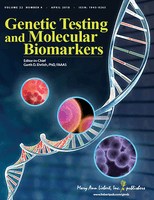
Genetic Testing and Molecular Biomarkers
Pioneering Discoveries in Genetic Testing and Biomarker Innovation.Genetic Testing and Molecular Biomarkers, an esteemed journal published by MARY ANN LIEBERT, INC, serves as a pivotal platform for advancing the field of genetic research and its applications in medicine. Focused on the innovative intersections of genetics and biomarker discovery, this journal has consistently contributed meaningful insights since its inception in 2009, with its scope evolving through 2024. With an ISSN of 1945-0265 and an E-ISSN of 1945-0257, it offers both traditional and open access options to cater to a broad audience of researchers, professionals, and students. Despite its current classification in the Q4 and Q3 quartiles for Genetics (clinical) and Medicine (miscellaneous) respectively, the journal remains committed to publishing high-quality, peer-reviewed articles that push the boundaries of knowledge in the field. As the landscape of genomic medicine continues to expand, Genetic Testing and Molecular Biomarkers is positioned as a crucial resource for disseminating cutting-edge discoveries and fostering interdisciplinary collaboration.

INTERNATIONAL JOURNAL OF LEGAL MEDICINE
Bridging Disciplines: Where Law Meets MedicineINTERNATIONAL JOURNAL OF LEGAL MEDICINE, published by SPRINGER, stands at the forefront of research in the fields of legal medicine, pathology, and forensic science. With an ISSN of 0937-9827 and an E-ISSN of 1437-1596, this esteemed journal has successfully maintained its reputation as a leading publication since its inception in 1990, providing a platform for the dissemination of cutting-edge research and case studies. The journal is recognized as a Q1 category publication in the 2023 Pathology and Forensic Medicine quartiles, ranking #44 out of 208 in its category on Scopus, reflecting its significant contribution to the academic community—demonstrated by its impressive 79th percentile. While the journal operates under a traditional subscription model, it is committed to enhancing access to critical insights in legal medicine. The INTERNATIONAL JOURNAL OF LEGAL MEDICINE invites researchers, professionals, and students to explore its manuscripts that shed light on the intersection of law and medicine, thus pushing the boundaries of what is known in these vital fields.
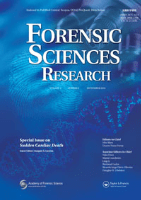
Forensic Sciences Research
Fostering Collaboration in Forensic ExcellenceForensic Sciences Research is a distinguished open-access journal published by Oxford University Press, dedicated to the interdisciplinary field of forensic sciences. Since its inception in 2016, the journal has rapidly established itself as a vital resource for researchers, professionals, and students in areas including analytical chemistry, anthropology, biochemistry, genetic studies, and various branches of forensic medicine. With an impressive range of impact factor metrics across multiple categories—including Q1 rankings in Anthropology for 2023—this journal provides unparalleled access to high-quality research while facilitating the dissemination of innovative ideas and methodologies in forensic science. Researchers benefit from the journal's extensive Scopus ranking, which showcases its influential position within the academic community. The open-access model allows global accessibility, ensuring that vital forensic research reaches a diverse audience and contributes to advancements in public safety and legal processes. For those engaged in the practical realities of forensic investigation or the theoretical underpinnings of the field, Forensic Sciences Research is an indispensable journal that continues to advance knowledge and foster collaboration within the forensic community.

Application of Clinical Genetics
Fostering Collaboration in Clinical Genetics ResearchApplication of Clinical Genetics is a premier open-access journal published by Dove Medical Press Ltd., dedicated to advancing the field of clinical genetics since its inception in 2008. Based in New Zealand, this journal has established itself as a significant resource for researchers, clinicians, and students alike, contributing to the body of knowledge in both genetic medicine and clinical applications. With an impact factor reflecting its contributions to the field, the journal holds positions in the Q2 and Q3 quartiles of the 2023 Genetics categories, showcasing its relevance and scientific merit. Furthermore, it ranks #43 out of 99 in Clinical Genetics and #153 out of 347 in Biochemistry, Genetics, and Molecular Biology, indicating robust performance amongst its peers. The journal’s broad scope, encompassing various aspects of clinical genetics, ensures that it remains at the forefront of critical discussions, innovative research, and applications essential for the progression of personalized medicine. Researchers and professionals are encouraged to explore its openly accessible content that fosters collaboration and the sharing of knowledge in this dynamic and rapidly evolving field.

Anil Aggrawals Internet Journal of Forensic Medicine and Toxicology
Exploring the Intersection of Science and JusticeAnil Aggrawals Internet Journal of Forensic Medicine and Toxicology, an esteemed publication in the field of forensic medicine and toxicology, is dedicated to disseminating innovative research and critical insights since 2000. Published by ANIL AGGRAWALS INTERNET JOURNAL FORENSIC MEDICINE & TOXICOLOGY, the journal caters to professionals, researchers, and students keen on advancing their understanding of forensic science, including its intersections with law and public health. Although it currently holds a Q4 quartile ranking in Law, Pathology and Forensic Medicine, and Toxicology, the journal provides a vital platform for underrepresented studies, encouraging a diverse range of scholarly contributions. With its open access model, the journal enhances visibility and accessibility, ensuring that valuable research can reach a wider audience. As the journal continues to evolve, it plays a crucial role in bridging theoretical knowledge and practical applications, thereby enriching the discourse within its fields of study and fostering inter-disciplinary collaborations.

Forensic Science Medicine and Pathology
Exploring the Nexus of Forensic Methodologies and Medical InsightsForensic Science Medicine and Pathology is an esteemed journal published by HUMANA PRESS INC, focusing on the critical intersections of forensic science, medicine, and pathology. Since its inception in 2005, this journal has provided a vital platform for researchers and practitioners to share innovative studies and findings that enhance our understanding of forensic methodologies and their applications in medical contexts. With an impact factor reflecting its significant contribution to the field, it holds a Q3 ranking in Medicine (miscellaneous) and a commendable Q2 ranking in Pathology and Forensic Medicine as of 2023, indicating its growing influence among scholarly circles. The journal is indexed in Scopus, ranking #76 out of 208 in the Medicine – Pathology and Forensic Medicine category, placing it in the 63rd percentile. Despite it not being an Open Access journal, it remains a crucial resource for professionals, students, and researchers dedicated to forensic sciences and related disciplines. For those seeking cutting-edge research and advancements in forensic methodologies, this journal is an essential addition to any academic repertoire.
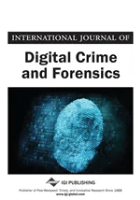
International Journal of Digital Crime and Forensics
Pioneering Research in Digital Crime and Forensic SolutionsWelcome to the International Journal of Digital Crime and Forensics, an esteemed publication spearheaded by IGI Global, dedicated to advancing research and disseminating knowledge in the crucial fields of cybersecurity, digital crime, and forensic analysis. With its inaugural issue published in 2009, this journal has continually focused on providing a platform for innovative research, insightful case studies, and practical solutions aimed at addressing contemporary challenges in digital criminal activity and forensic investigation. While currently classified in the Q4 Category for software within the Computer Science domain according to 2023 rankings, and positioned in the 32nd percentile of Scopus Ranks, the journal remains committed to enhancing its impact and visibility in the scholarly community. By maintaining a rigorous peer-review process, the journal ensures high-quality contributions that equip researchers, professionals, and students with essential tools and knowledge. Although the journal operates under a subscription model, it plays an integral role in shaping the discourse surrounding digital crime and forensics, making it an indispensable resource for anyone serious about understanding and combating digital threats.
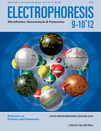
ELECTROPHORESIS
Advancing the Frontiers of Electrophoretic ScienceELECTROPHORESIS, published by Wiley, stands as a premier journal dedicated to advancing the field of analytical chemistry, biochemistry, and clinical biochemistry. With an ISSN of 0173-0835 and an E-ISSN of 1522-2683, this journal has been a vital resource since its inception in 1980 and is poised to continue its journey through to 2024. Operating out of Germany, it holds a significant standing in the academic community, featuring in the Q2 category for Analytical Chemistry and in the Q3 tier for both Biochemistry and Clinical Biochemistry as of 2023. The journal ranks impressively within Scopus, occupying the 43rd position out of 156 in Analytical Chemistry and the 44th spot out of 117 in Clinical Biochemistry, ensuring its relevance and impact in these disciplines. Although it does not currently offer open access, ELECTROPHORESIS remains an essential publication for researchers, professionals, and students seeking cutting-edge insights and developments that influence the methodologies and technologies underpinning electrophoretic techniques.

Legal Medicine
Fostering knowledge at the crossroads of ethics and practice.Legal Medicine, ISSN 1344-6223, published by ELSEVIER IRELAND LTD, stands as a pivotal academic journal within the realms of forensic medicine and legal ethics. Operating from the Netherlands, this journal has established a strong reputation among researchers and practitioners since its inception in 1999, with the goal of advancing knowledge in the intersection of legal and medical disciplines. With a commendable Q2 categorization in both Issues, Ethics and Legal Aspects and Pathology and Forensic Medicine, it ranks among the noteworthy publications in these fields, placing it in the 51st percentile for Pathology and Forensic Medicine and 51st for Nursing-related ethical issues. The journal not only serves as a repository for innovative research and practical case studies but also emphasizes the importance of ethical considerations in medical legal scenarios. Although it does not offer Open Access options, it remains a crucial resource for professionals, researchers, and students seeking to stay informed about the latest developments that shape legal medicine. Access to its contents promises to enhance understanding and inspire advancements in both forensic science and the ethical frameworks surrounding them.
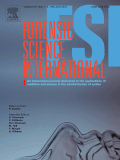
Forensic Science International
Pioneering Discoveries in Forensic Medicine and LawForensic Science International is a premier journal published by Elsevier Ireland Ltd, dedicated to advancing the field of forensic science through interdisciplinary research and scholarship. Since its inception in 1978, this esteemed journal has provided a platform for vital research, receiving recognition in the Q1 category for both Law and Pathology and Forensic Medicine as of 2023, underscoring its significant impact in these domains. It currently ranks 54th out of 1025 journals in Social Sciences - Law and 51st out of 208 in Medicine - Pathology and Forensic Medicine, placing it in the top echelons of academic journals according to Scopus metrics. Forensic Science International transitioned to Open Access in 2019, ensuring that critical findings are widely available to the global research community and enhancing collaboration among forensic professionals. With a forward-looking scope that evolves to meet the challenges and innovations of forensic science, this journal remains a pivotal resource for researchers, practitioners, and students who are committed to the continued advancement of forensic science and its applications in legal contexts.